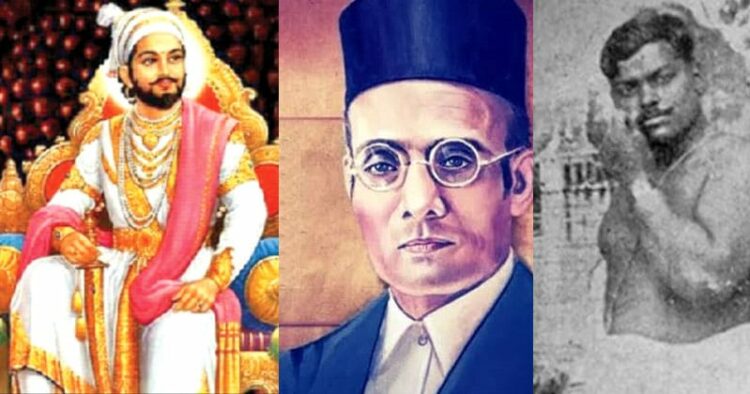The Uttar Pradesh government brought significant changes in the state board syllabus. The students of the state will now be studying about fifty national heroes whose life and contributions are missing from our text books. These national heroes include; Chhatrapati Shivaji Maharaj, Chandrashekhar Azad, Vinayak Damodar Savarkar and others.
The move comes with the intent to give a perspective to the younger generation about the sacrifices made by the sons of the soil. The Uttar Pradesh board has been thinking to incorporate the stories of these heroes for a long time now and after receiving green signal from the Chief Minister of the state Yogi Adityanath, the decision came out.
The recent changes made by the board will be incorporated in the subjects from the session 2023-24 only. The subject including the life stories of these heroes are compulsory for the students. Every student is required to pass the subject, to clear the class, however, marks in this subject will not be a part of their final assessment results of class 10 and 12 board.
A classwise list of the revolutionaries to be studied in respective classes have been uploaded on the website of the Uttar Pradesh Board. As per the details out of 27,000 schools including government and semi-government, subject involving revolutionaries is made compulsory from class 9 to class 12.
Class 9 students will study Chandrashekhar Azad, Birsa Munda, Begum Hazrat Mahal, Veer Kunwar Singh, Ishwar Chandra Vidyasagar, Gautam Buddha, Jyotiba Phule, Chhatrapati Shivaji Maharaj, Vinayak Damodar Savarkar, Vinoba Bhave, Srinivasa Ramanujan and Jagdish Chandra Bose.
Class 10 students will study life stories of Mangal Pandey, Roshan Singh, Sukhdev, Lokmanya Tilak, Gopal Krishna Gokhale, Mahatma Gandhi, Khudiram Bose and Swami Vivekananda.
Class 11 students will study the life stories of Ram Prasad Bismil, Bhagat Singh, Dr. Bhimrao Ambedkar, Sardar Vallabhbhai Patel, Pandit Deendayal Upadhyay, Mahavir Jain, Pandit Madan Mohan Malviya, Arvind Ghosh, Raja Rammohan Roy, Sarojini Naidu, Nana Saheb, Maharishi Patanjali, surgeon Sushruta and Dr. Homi Jehangir Bhabha.
Class 12 students will study, Ramakrishna Paramhans, Ganesh Shankar Vidyarti, Rajguru Rabindranath Tagore, Lal Bahadur Shastri, Rani Laxmibai, Maharana Pratap, Bankim Chandra Chatterjee, Adi Shankaracharya, Guru Nanak Dev, Dr APJ Abdul Kalam, Ramanujacharya, Panini, Aryabhata and CV Raman.
The Uttar Pradesh Board is one of the largest state boards in the country. With the updated syllabus the biography of these great personalities will be read by over 1 crore students in classes 9 to 12.
Notably in past months, the board announced that the students from Government schools in Uttar Pradesh will study and read about e-governance, artificial intelligence, cryptocurrency, drone technology, and information technology (IT) advancements.
According to the board secretary Dibyakant Shukla, Prayagraj-headquartered Uttar Pradesh Madhyamik Shiksha Board has updated the syllabus in accordance with the National Education Policy 2020 for classes 9 to 12 and uploaded it on its official website for the convenience of the students. The changes are specifically made in the curriculum for computer learning, which is taught in 28000 schools of UP board.
The syllabus is revised with the guidance and approval of subject experts. It’s a significant change as it doesn’t follow the current course prescribed by the National Council of Educational Research and Training (NCERT).
The experts have replaced traditional computer programmings languages such as C++ and HTML with Python and Java for class 11 and 12 students. This decision was made because HTML and C++ languages are not practised these days; instead, Core Java, Robotics and Drone Technology are introduced in the Class 12 syllabus.
The class 11 students will study the Internet of Things (IoT), artificial intelligence, blockchain technology, augmented and virtual reality, 3-D printing and cloud computing.Apart from HTML and C++, the board has also removed chapters on computer generations, history, and types of computers because of their irrelevance. The class 10 students will study ways to avoid hacking, phishing and cyber fraud. They will also be taught about artificial intelligence, drone technology and cyber security.
Even students will study e-governance as a part of their curriculum.
Now class 9 students will be taught programming techniques, computer communication and networking, which class 10 students earlier studied.





















Comments